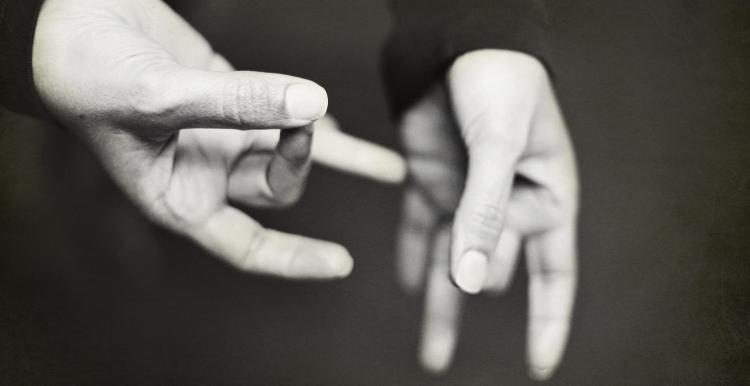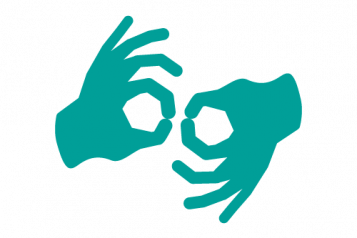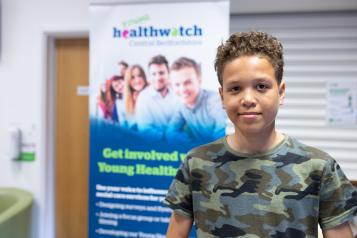How Deaf aware are you?
As we continue to live with the pandemic, this year’s event aims to raise awareness of Deaf issues while focusing on positivity and togetherness .

Deaf or deaf – it’s not a typo – so what’s the difference?
- The word deaf is used to describe or identify someone who has a severe hearing problem. Sometimes it is used to refer to people who are’ hard of hearing’ too.
- Deaf with a capital D refers to people who have been deaf all their lives, or since before they started to learn to talk. It is an important distinction. Many Deaf people tend to communicate in sign language as their first language. For most Deaf people English is a second language and sometimes understanding spoken English can be a problem.
Some facts about deafness
- There are about 10-11 million people in the UK who are Deaf or hard of hearing.
- Deafness is the third most common disability in the world …. but you probably wouldn’t spot a Deaf person in a crowd!
- It’s an invisible disability so often goes unnoticed, making it easier for those living with hearing loss to be ignored or forgotten.
- About 9 in every 10 deaf children are born to hearing parents.
- Hearing loss is associated with mental health conditions such as dementia but also with physical health conditions such as diabetes, cardiovascular disease, anaemia, rheumatoid arthritis, sleep apnea, balance problems and an increased risk of falls.
Hearing loss in older people
- Hearing loss increases with age – nearly 42% of those aged over 50 years have hearing loss, increasing to about 71% of people aged 70years and older.
- About 400,000 older people live in care homes and are disproportionately affected by hearing loss, with approximately 75% of residents having a hearing problem.
- Unassisted hearing loss have a significant impact on older people leading to social isolation, depression, reduced quality of life and loss of independence and mobility.
British Sign Language- BSL – what is it?
- Most Deaf people who use sign language use British Sign Language, or BSL. It’s a combination of hand gestures, facial expressions, and body language.
- BSL isn’t simply English with hand signs, it is a different language with its own grammar and sentence construction. While you would say “what is your name?” in English, a BSL user would sign, “your name, what?”
- You might assume that sign language across the world is the same – but British Sign Language is totally different to other sign languages such as American Sign Language or Japanese Sign Language
- Within the UK, there are regional variations of BSL just like there are with spoken language.
- Lip-reading helps deaf people to understand what others are saying, but even the best lip-readers still miss up to 40% of what has been said.
- 9 in every ten deaf children are born to hearing parents, but only 1 in 10 of those parents will learn sign language to be able to communicate fully with their son or daughter.
If you need the help of a British Sign Language Interpreter – Healthwatch can help!
If you have an appointment at a hospital in East Kent, you can now get a card that clearly states that you need an interpreter for your appointment.
You can get a card sent to you by our colleagues at Healthwatch Kent. More info here
How can YOU help?
Communication - even if you do not know BSL!
Even today most deaf people do not use BSL and use of BSL is not great more widely.
So…Lip-reading helps deaf people to understand what others are saying, but even the best lip-readers still miss up to 40% of what has been said. So please….
- Politely Get Their Attention
- Face them and hold eye contact.
- Check background noises and lighting. Deaf people communicate visually, so keep a check on the right lighting and no loud background noises.
- Avoid covering your mouth – lip reading is hard if your mouth is covered!
- Speak clearly and not too fast, but do not yell, exaggerate, or over-pronounce.
- Be expressive with your body gestures and facial expression – it’s more fun and makes for a better-quality interaction.
- Write or draw your point down. Don’t be afraid to write or draw to help understanding.
- Be patient!
Learn some basic sign language!
There are many societies and on-line resources for learning BSL such as:
- The RNID (Royal National Institute for Deaf People)
- British Sign
- BSL courses
There is lots more information online.
Check access to a Registered and qualified Sign Language Interpreter.
Ask your local hospital, GP, and other health services if they provide access to a registered and qualified sign language interpreter for people with hearing loss. If they don’t suggest that they should.
You might also ask your place of work too about this.
Check access to a Registered and qualified Sign Language Interpreter.
Ask your local hospital, GP, and other health services if they provide access to a registered and qualified sign language interpreter for people with hearing loss. If they don’t suggest that they should.
You might also ask your place of work too about this.
Write a letter to your MP about access to Registered and qualified Sign Language Interpreter in the House of Commons and more widely in society.
Facilities are poor in the House of Commons for people who are hard of hearing – ask your MP to improve this! Also ask them about promoting BSL in their constituencies.
Talk to us if you have any concerns about access to an interpreter
Just tell us your story here
Tell us what it's like for you when you go to the hospital and whether you have found it hard to get an interpreter to help you.
Get more information on Deaf Awareness Week 2021
There are loads of information on the internet and a few are listed here
- The RNID (Royal National Institute for Deaf People) are running a free online seminar every day in Deaf Awareness Week ... - Louder than Words.
- The UK Council on Deafness has links to resources
- Twinkl wants to help support Deaf Awareness Week and has some fantastic resources for teachers and parents.


